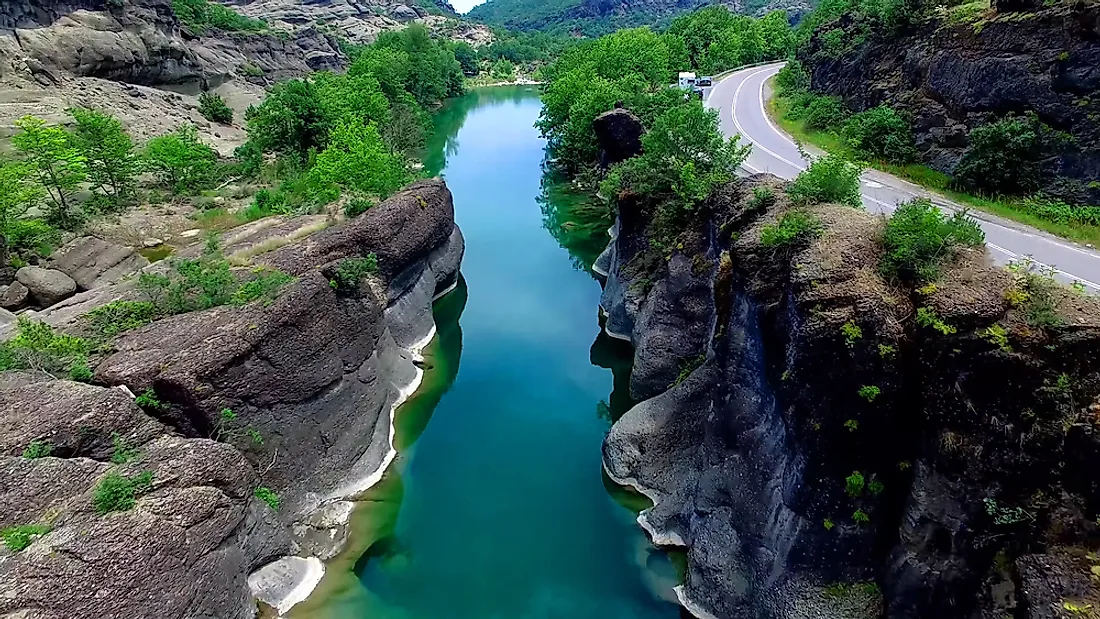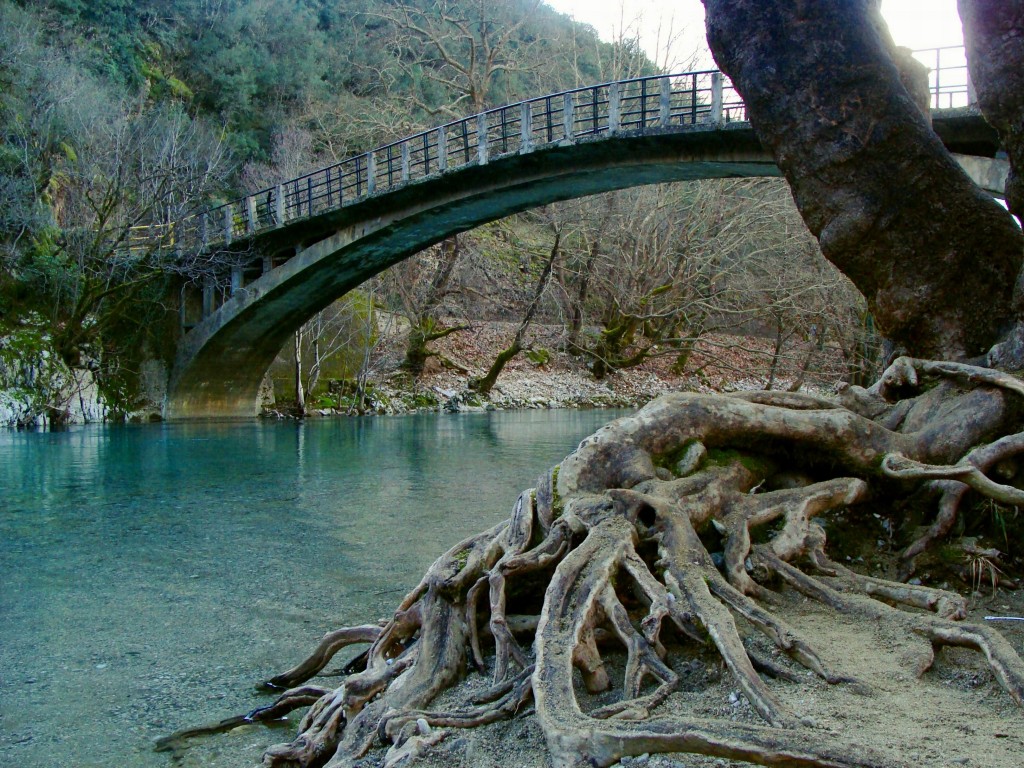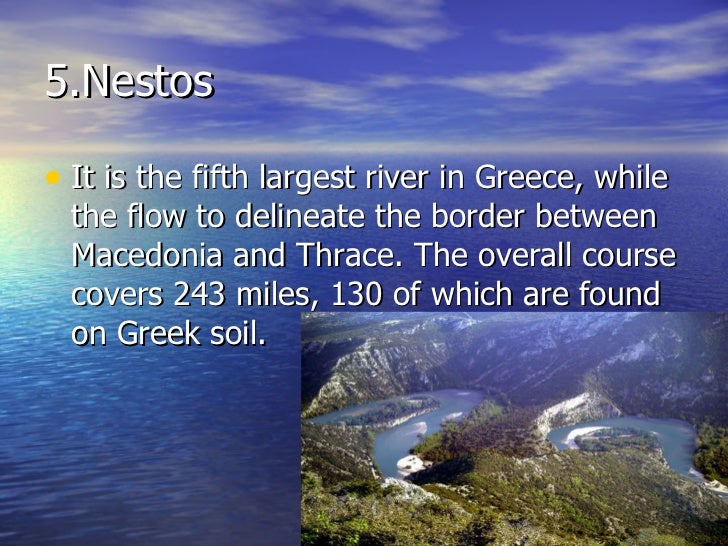Navigating the Flow: Exploring the Rivers of Greece
Related Articles: Navigating the Flow: Exploring the Rivers of Greece
Introduction
With enthusiasm, let’s navigate through the intriguing topic related to Navigating the Flow: Exploring the Rivers of Greece. Let’s weave interesting information and offer fresh perspectives to the readers.
Table of Content
Navigating the Flow: Exploring the Rivers of Greece

Greece, a land renowned for its ancient history, vibrant culture, and stunning landscapes, also boasts a network of rivers that have shaped its geography, influenced its history, and sustained its people for millennia. Understanding the rivers of Greece is essential for appreciating the country’s multifaceted character. This article provides a comprehensive overview of these waterways, their significance, and their role in the Greek landscape.
A Tapestry of Waterways: The Rivers of Greece
The rivers of Greece, though often overshadowed by the country’s iconic coastline, are a vital part of its natural tapestry. They flow through diverse landscapes, from snow-capped mountain peaks to fertile plains, carving out valleys and contributing to the country’s unique biodiversity. While Greece lacks the mighty rivers of other European nations, its smaller waterways are no less significant.
The Major Rivers of Greece:
-
The Axios River: Greece’s longest river, the Axios, originates in the Republic of North Macedonia and flows through northern Greece, forming a natural boundary between the regions of Macedonia and Thrace. It empties into the Thermaic Gulf, playing a crucial role in irrigation and agriculture.
-
The Aliakmon River: The second-longest river in Greece, the Aliakmon, also originates in North Macedonia and flows through the region of Western Macedonia, before emptying into the Thermaic Gulf. This river is vital for irrigation, hydropower generation, and fishing.
-
The Evros River: Marking the border between Greece and Turkey, the Evros River is a significant waterway in the northeastern region of Thrace. Its delta is a haven for diverse bird species and a crucial habitat for endangered species.
-
The Achelous River: Flowing through the regions of Epirus and Western Greece, the Achelous is renowned for its dramatic gorges and its role in hydroelectric power generation. Its valley is home to ancient ruins and picturesque villages.
-
The Peneios River: Originating in Mount Pindus, the Peneios River flows through the region of Thessaly, known for its fertile plains. It empties into the Aegean Sea, supporting a rich agricultural sector.
The Significance of Rivers in Greece:
-
Water Resource: Rivers serve as vital sources of freshwater for agriculture, industry, and domestic use. They are crucial for irrigation, particularly in the drier regions of the country.
-
Hydropower Generation: Many rivers, especially those flowing through mountainous regions, are harnessed for hydroelectric power generation, contributing to Greece’s energy needs.
-
Transportation: Historically, rivers played a significant role in transportation, connecting various regions of Greece. While their role in modern transportation has diminished, they remain important for inland navigation and recreational boating.
-
Biodiversity: Rivers and their surrounding ecosystems support a rich array of flora and fauna, including numerous fish species, birds, and mammals. They are essential for maintaining biodiversity and protecting endangered species.
-
Cultural Heritage: Rivers have long been interwoven with Greek culture, inspiring myths, legends, and artistic expressions. They have played a central role in shaping the country’s identity and history.
The Rivers of Greece: A Map of Life
A map of Greece’s rivers is not merely a geographical representation; it is a reflection of the country’s lifeblood. It highlights the interconnectedness of its landscapes, the importance of its water resources, and the historical and cultural significance of these waterways. Studying the rivers of Greece reveals the multifaceted nature of this ancient land, its unique beauty, and its enduring resilience.
FAQs: Rivers of Greece
1. What is the longest river in Greece?
The longest river in Greece is the Axios River, which originates in North Macedonia and flows through northern Greece.
2. Which river forms the border between Greece and Turkey?
The Evros River marks the border between Greece and Turkey.
3. What is the significance of the Achelous River?
The Achelous River is renowned for its dramatic gorges and its role in hydroelectric power generation. Its valley is also home to ancient ruins and picturesque villages.
4. What are some of the environmental challenges facing Greece’s rivers?
Pollution from industrial and agricultural activities, as well as over-exploitation of water resources, pose significant environmental challenges to Greece’s rivers.
5. How do rivers contribute to Greece’s tourism industry?
Rivers offer opportunities for recreational activities such as fishing, boating, and kayaking, attracting tourists to the country’s natural beauty.
Tips for Exploring the Rivers of Greece:
-
Visit the Delta of the Evros River: The Evros Delta is a haven for birdwatchers, offering a chance to observe diverse bird species in their natural habitat.
-
Explore the Achelous River Gorge: Take a boat trip through the dramatic Achelous River Gorge, experiencing the rugged beauty of this natural wonder.
-
Hike along the Peneios River: Enjoy a scenic hike along the banks of the Peneios River, passing through fertile plains and ancient ruins.
-
Visit the Axios River Delta: Observe the diverse flora and fauna of the Axios River Delta, a protected area known for its ecological significance.
-
Experience the rivers of Greece by boat: Rent a boat and explore the waterways, experiencing the country’s natural beauty from a unique perspective.
Conclusion: A Legacy of Water
The rivers of Greece are a testament to the country’s rich natural heritage and the enduring power of water. They have shaped its landscapes, sustained its people, and inspired its culture for millennia. Understanding these waterways is essential for appreciating the multifaceted character of Greece, its resilience, and its enduring connection to the natural world. As we navigate the flow of time, let us remember the importance of preserving these vital rivers and ensuring their continued flow for generations to come.








Closure
Thus, we hope this article has provided valuable insights into Navigating the Flow: Exploring the Rivers of Greece. We thank you for taking the time to read this article. See you in our next article!